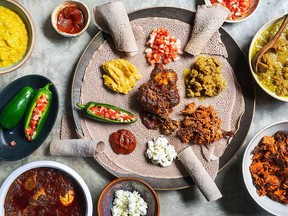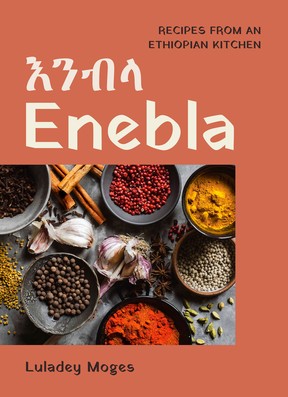With Enebla, author Luladey Moges turned unexpected downtime into the realization of a long-held dream
Get the latest from Laura Brehaut straight to your inbox

Reviews and recommendations are unbiased and products are independently selected. Postmedia may earn an affiliate commission from purchases made through links on this page.
Our cookbook of the week is Enebla: Recipes from an Ethiopian Kitchen by Luladey Moges. To try a recipe from the book, check out: Doro wot (spicy chicken stew), ambasha (Ethiopian traditional bread) and buna (Ethiopian traditional coffee ceremony).
Luladey Moges’ hotel job had recently relocated to Los Angeles when COVID-19 hit. She didn’t know anyone in the city. And, after being furloughed for what ended up being 18 months, she suddenly had plenty of free time on her hands.
No need to go at the internet alone. We test products, interview pros and do what’s required to get you unbiased, unadulterated, unsponsored recommendations. We’re a weekly newsletter, a cool one. Talk Thursdays.
Thanks for signing up!
A welcome email is on its way. If you don't see it, please check your junk folder.
The next issue of NP Shopping Essentials will soon be in your inbox.
“I had full focus and a very, very clear calendar,” says Moges, laughing.
Writing an Ethiopian cookbook had long been a dream, but it took a pandemic for her to find the time to do so. Moges dedicated her unexpected downtime to writing her debut, Enebla (TouchWood Editions, 2022), named after the Amharic word for “let’s eat.”
Born in the Ethiopian capital of Addis Ababa, Moges moved to the United States with her family when she was 12.
She has worked in hospitality for more than 20 years. First front-of-house (bartending, bussing, hostessing and serving), then managing restaurants. In pursuit of work-life balance, she switched to hotels five years ago and is now a group sales manager in Los Angeles.
The idea of one day writing a cookbook embedded itself when she was at university in Norfolk, Va. With the closest Ethiopian restaurant 150 km away in Richmond, her friends and younger sister, Lily, often asked her for recipes, which she happily provided.
“I would always be either emailing or texting recipes,” Moges recalls. “And then one of my friends randomly was like, ‘You know, you should probably just put this all in a book or something.’ And I was like, ‘Yeah, one day.’”

During lockdown, Moges found the opportunity she had been looking for. Her entire family lives on the East Coast of the United States. After her sister convinced her not to drive cross-country with her cat, Chowder, as her travel companion, Moges put all of her time and effort into writing Enebla.
“I really don’t like doing anything halfway. I want to commit to it 100 per cent,” she says. “(If not for the pandemic), I would have never had the time to actually stand still and really devote my time to it.”
Writing the book was therapeutic, she adds. Developing the 60-plus recipes and sifting through family photos — which appear alongside food photography by Canadian photographer and writer DL Acken — reconnected her with her past.
“There’s nothing like silence. When it’s just you and no distractions. (I was) essentially reliving my childhood as I wrote it down,” says Moges.
Every one of the dishes in the book has a memory associated with it, she adds. The process of writing brought the memories flooding back.
Now, whenever Moges cooks or eats asa (whole fried fish), for example, she can’t help but think of trips to Merkato, a sprawling open-air market in Addis Ababa. Asa with injera or bread was the only item on the menu at one of the spots she and her late uncle Haile used to eat at.
“I’ve eaten fried fish so many times since then and I thought it was just a dish,” she says. “But I definitely have a closer (connection to) these memories of each dish going through the writing process.”
People have this fear of not wanting to experiment or step out of their norm. So, I think a lot of times, it's just opening people's minds and giving them an opportunity into this world.
The recipes Moges features in Enebla are the result of years of trial and error. First as a student, then as a hospitality professional, she found ways to make the dishes she craved in a shorter period of time. “Sped-up” versions that retained the spirit and soul of the original but suited her lifestyle.
At high school in Lancaster, Pa. — “in the middle of nowhere with horse and buggies” — Moges set out to find her own way of creating family recipes.
“You have no choice but to make it yourself,” she laughs. “So, what do you do then? Who has the time to make these dishes? And I’m not going to lie. Most of it was calling Mom and asking for care packages to be shipped to me until I started really, really cooking it.”
She wrote Enebla with different potential audiences in mind: People unfamiliar with Ethiopian cuisine, those who enjoy eating it at restaurants but don’t know how to make it, and people like her sister, who belong to the culture and want to learn.
“I wanted it to be friendly and light and short,” Moges says of the book. She started with a long list of recipes, then narrowed it down to the most popular dishes, striking a balance between meat and vegetables.
You can find nearly all of the ingredients at your local grocery store, she adds: “It’s very easily accessible.” And despite misconceptions about intense chili heat, dishes can be easily adapted to suit your preferences.
When she first started cooking for her friends at university, Moges arrived at what she calls the “Taco Bell test” to accommodate different spice levels. Asking her guests how they like their tacos gave her insight into whether she should make fiery awaze tibs (extra-spicy beef stir-fry) or the milder derek tibs (dry beef stir-fry).
Moges offers a mild version of almost every spicy dish in the book. The accompanying recipe for doro wot (spicy chicken stew), for instance, can be made into alicha doro wot (mild chicken stew) simply by using turmeric instead of berbere (a staple Ethiopian spice blend).
“I want to make it easily available to anyone who wants to give it a try,” says Moges. “People have this fear of not wanting to experiment or step out of their norm. So, I think a lot of times, it’s just opening people’s minds and giving them an opportunity into this world.”
-

Cook this: Three recipes from Enebla, including how to perform an Ethiopian coffee ceremony
-

Colu Cooks: 'Food doesn't need to be fussy to be beautiful'
Since the book came out on Oct. 4, Moges has heard from readers who were surprised to find recipes for Italian-influenced dishes such as chicken cotoletta (schnitzel), lasagna, pasta al forno (an Ethiopian-style one-pot pasta dish) and tiramisu.
In 1935, Italy led an unsuccessful invasion into Ethiopia. Italian troops retreated in 1941, but cultural influences remained. Growing up in Addis Ababa, Moges attended an Italian school, and spoke Italian as well as her native Amharic.
“You can go to an Ethiopian restaurant and ask for lasagna and most of them usually have it. Or if you go to an Ethiopian house over a holiday, or if you go to a wedding or any event, we have lasagna being served. That’s how prominent it is in our cuisine,” says Moges.
“There’s also the fact that some of the names are very similar. Even our language has a huge Italian influence. So, it’s intertwined.”
Enebla joins a handful of other English-language Ethiopian cookbooks, and Moges feels honoured to be able to share it with the world.
“Our way of cooking is usually passed down from generation to generation. Like my grandmother, my mom, my aunties to me and so forth. And I feel like sometimes there needs to be a way to bridge that gap so that we can share it with everyone,” says Moges.
“I really hope I bring the love and respect that I have for our cuisine to everyone’s home.”
Get the latest from Laura Brehaut straight to your inbox







